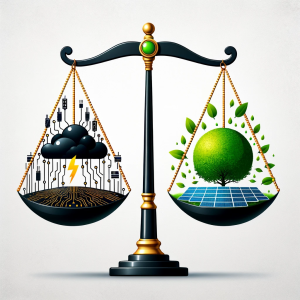Why governments should enforce Big Tech companies to be transparent about their environmental and social impact
Introduction
In 2022 it was estimated that roughly 1.7% of the world’s electricity was used by large Information and Communication Industry (ICT) services which power all computers giving power to Amazon and Google cloud. However, this 1.7% is projected to become 14% by 2040 in addition servers using the same annual terrawatt-hours as The Netherlands as soon as 2027. Apart from the environmental impact that Big Tech has, there are also detrimental societal consequences to these technologies. Not only does AI pose a serious threat to democracy, political stability, job security, and collective freedom in high-income countries, the technology also impacts human rights in the Global South. By controlling the digital ecosystem and exploiting underpaid workers, Big Tech is violating human rights in the Global South. Since these numbers and facts are not a positive influence to the reputation of Big Tech, these companies are rarely transparent about their environmental and social impact. Furthermore, all of these projections are merely based on current estimations as companies are not transparent regarding their actual usage. Due to this, many consumers are not able to make educated decisions on which companies to support or avoid. The transparency of a company plays a crucial role in fostering the engagement of customers, investors, and stakeholders. Studies have shown that consumers are willing to pay more for eco-friendly products. Additionally, raising awareness about the potential negative impacts of technologies like AI could curb their overuse. The parallels drawn between industries, such as pharmaceuticals and tech, underscore the urgency of demanding transparency in the latter, especially concerning environmental impacts like e-waste management and resource sourcing. While some argue that transparency regulations stifle innovation by exposing insights, it may also be an opportunity for a creative renaissance in sustainability innovation. Therefore, we argue that governments should take affirmative action in order to regulate Big Tech companies and ensure transparency of these parties.
Engagement with Consumers
Company transparency regarding sustainability can help investors, stakeholders, and consumers compare organisations and assess whether or not they either want to invest, or purchase goods from these companies. Without transparency stakeholders do not have the opportunity to do this and simultaneously make deliberate sustainable choices. Studies show that consumers care about sustainability and would be willing to pay extra for sustainable services and goods. Also, transparency is an effective means to attract customer participation for brands. Therefore, when companies are making sustainable efforts, being transparent can actually have positive effects on their revenue. However, companies that are falling behind in sustainable transitions, are being incentivized to become more sustainable by regulations regarding transparency. These findings show that not only does transparency benefit companies that are already making great efforts in sustainability, it can improve the overall impact that companies have on the environment and society. However, when companies are not being forced by government regulations to be transparent, less sustainable companies might not want to be so open about their sustainability impact and greenwashing-risks may arise.
Transparency as a Means for Awareness
Another important aspect of transparency is that it fosters awareness among customers. Products that are environmentally friendly positively affect purchasing behavior. Therefore, more awareness regarding the negative impact of AI, would possibly decline the problem of overuse of these technologies. Furthermore, sustainability awareness in general is a driver for sustainability action. Meaning that fostering sustainability awareness is crucial if we want to encourage effective climate action.
Social Impact
Regulating transparency in a major industry is not, however, unprecedented. Pharmaceutical companies have been called for more transparency in recent years. While this transparency concerns mainly clinical trial data and pricing of medication, it still allows for consumers to make informed decisions about their healthcare options. Even though the effects of the pharmaceutical industry may seem to impact consumers directly, the tech industry’s influence can be equally personal and immediate. Take, for instance, the lifecycle of electronic devices (such as those illustrated in figure 1): once discarded, they often find their way back to the regions where their raw materials originated. Unfortunately, these areas are typically underdeveloped, lacking the resources to handle e-waste safely. Consequently, inhabitants face potential exposure to hazardous materials like cobalt and lithium, which are both harmful and toxic to humans. Not only that but they can also infiltrate water sources and soil, jeopardising crops and environmental health. If we demand transparency in for instance the pharmaceutical sector for these reasons, why not demand the same from Big Tech companies?

Could Innovation be More Important Than Transparency?
Some argue that prioritizing innovation outweighs the importance of transparency, suggesting that transparency regulations might impede innovation. The rationale behind this perspective lies in the concern that transparency requirements could compel big tech companies to share insider secrets such as locations or which algorithms are being used to explain certain impacts that the company makes. This increased transparency could intensify competition as all players gain access to previously guarded “secrets”.
Nevertheless, while this argument holds merit, it also presents an opportunity for companies to embrace a fresh creative challenge in discovering the next green innovation. Enhanced transparency could prompt companies to closely observe their competitors’ strides toward environmental sustainability, potentially granting them a competitive advantage in meeting and surpassing new regulatory standards. We need to stop looking at regulations in terms of boundaries, and start seeing them as an incentive for creativity.
How Should They be Regulated?
We believe that implementing an annual report requirement for Big Tech companies could be a viable form of regulation. Such reports would comprehensively outline every step of their operational processes, including details on electricity consumption, its sources, water usage, and the sourcing of other materials used in their products.
Setting maximum thresholds for resource usage is essential, ensuring that companies operate within sustainable limits. If companies exceed these thresholds, imposing fines proportionate to their annual revenue would serve as a significant deterrent, motivating compliance with the regulations.
Given the sheer volume of annual reports from Big Tech companies, it’s indeed unrealistic for the government to review each one in a timely manner. Therefore, a practical approach would involve sampling a subset of these reports for official review. To ensure accountability and transparency, it’s imperative that these annual reports be made immediately accessible to the public.
By making these reports openly available, stakeholders and consumers gain the opportunity to review them at their convenience, empowering them to make informed decisions about which companies to support. Moreover, public accessibility fosters a culture of accountability, as consumers and advocacy groups can scrutinize the reports and call out companies that fail to adhere to regulations, raising awareness about sustainability practices and encouraging companies to prioritize environmental responsibility.
Conclusion
Overall, we believe that regulations regarding transparency on Big Tech companies’ environmental and societal impact have many advantages and should be installed. Not only can transparency benefit companies that are doing well regarding sustainability, it can incentivise other companies to start doing better. Secondly, companies’ transparency can lead to more awareness among consumers, which is crucial for sustainable transition. We should not distinguish between Big Tech companies and other polluting industries that are already regulated in terms of transparency. Finally, regulations can be a source of creativity and fuel green innovation. Moreover, transparency can drive competition towards more sustainable practices, creating a ripple effect across industries, which is exactly what our world needs in this time of crisis. To enforce adherence to the proposed regulations, companies should publish annual reports for government and public scrutiny, accompanied by proportionate to annual profit fines for non-compliance. In conclusion, transparency regulations represent a pivotal step towards fostering a more sustainable and responsible ICT ecosystem, where transparency, accountability, and innovation converge for the betterment of our planet and society.


